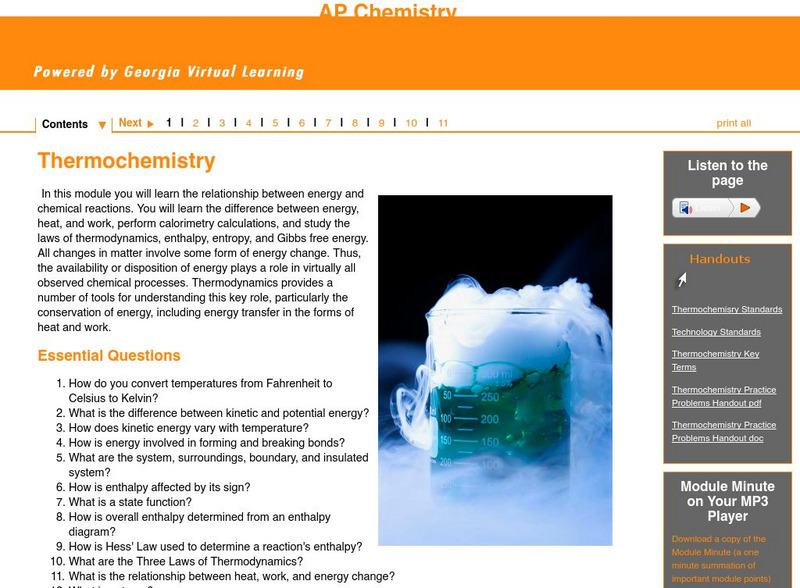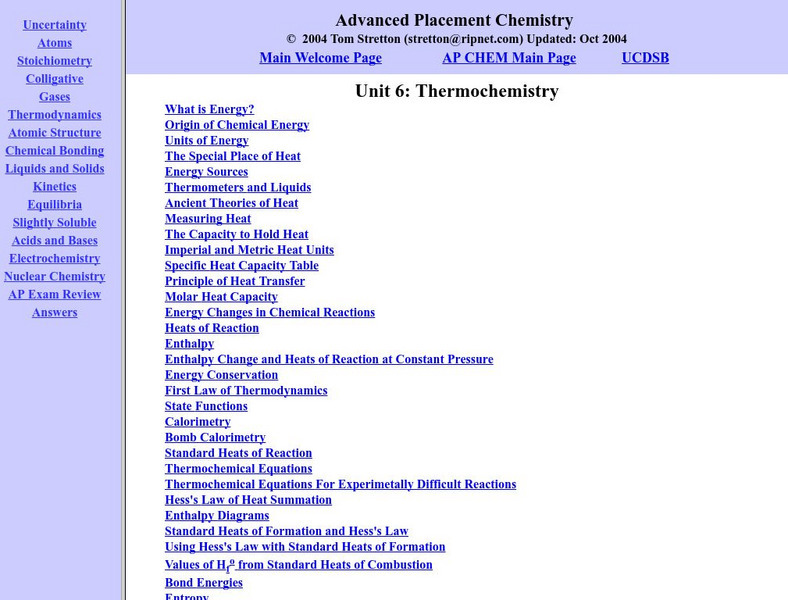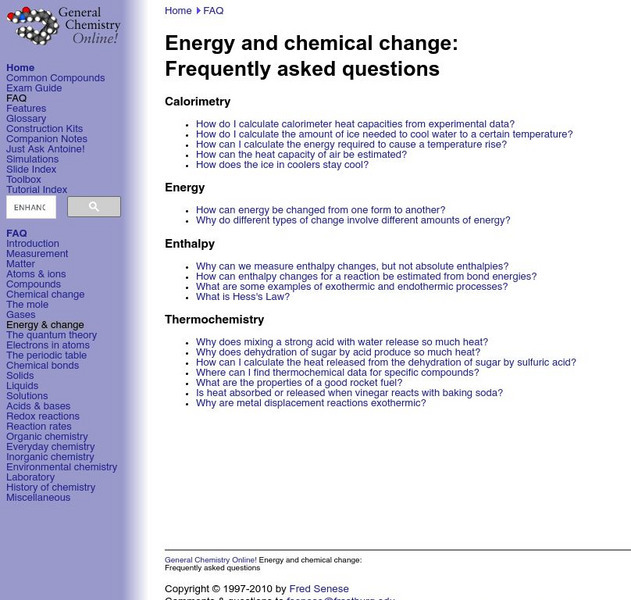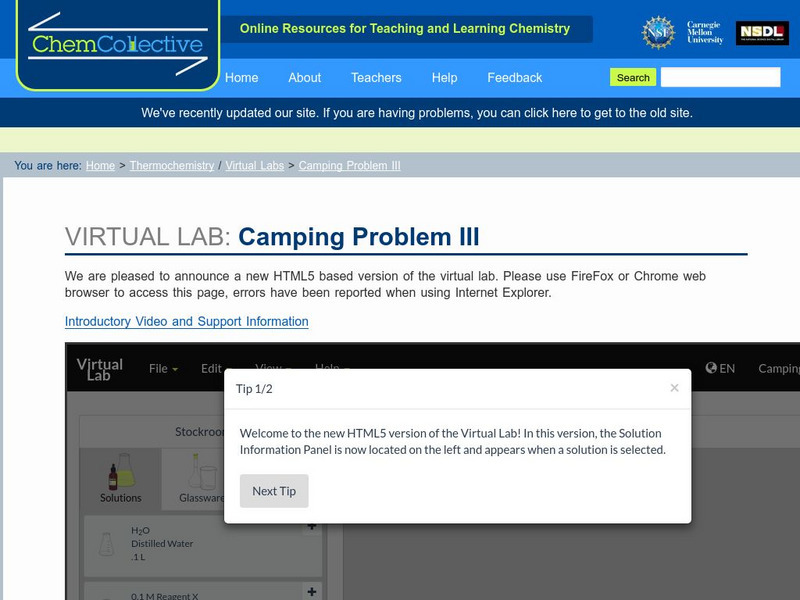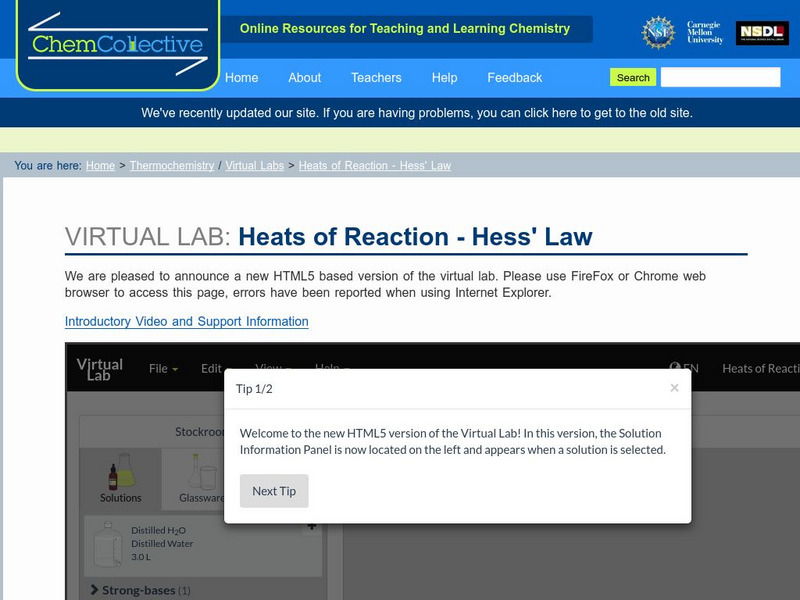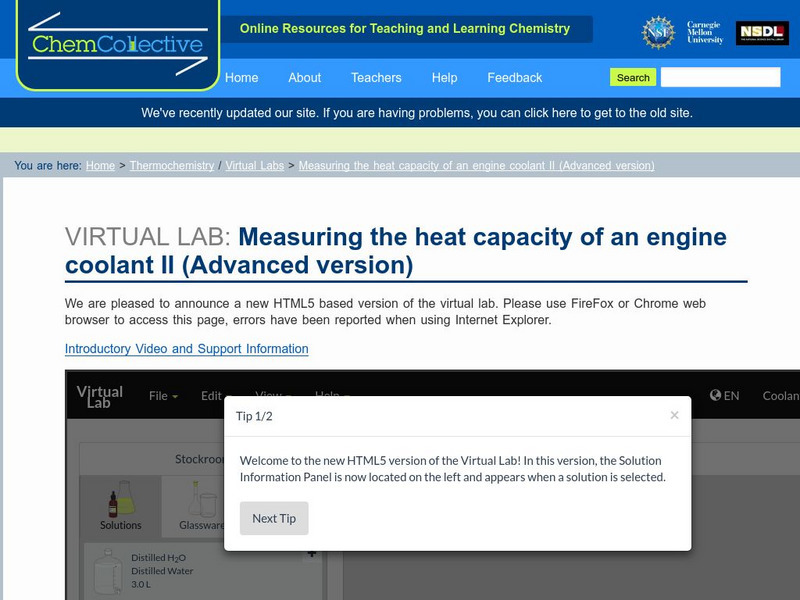Georgia Department of Education
Ga Virtual Learning: Chemistry: Thermochemistry
Through informational text, interactive practice problems, online labs, and virtual simulations, students are introduced to the concepts of thermochemistry.
Georgia Department of Education
Ga Virtual Learning: Ap Chemistry: Thermochemistry
In this module students learn the relationship between energy and chemical reactions, and understand the difference between energy, heat, and work. They perform calorimetry calculations, and study the laws of thermodynamics, enthalpy,...
Upper Canada District School Board
Tom Stretton's Advanced Placement Chemistry: Thermochemistry
This chemistry e-textbook provides students with AP-level reading and practice material on thermochemistry.
CK-12 Foundation
Ck 12: Flex Book Textbooks: Chemistry Second Edition
[Free Registration/Login may be required to access all resource tools.] A complete, web-based, multi-media textbook covering a wide variety of Chemistry concepts.
Khan Academy
Khan Academy: Thermochemistry Questions
This is a ten-question quiz pertaining to Thermal Chemistry.
Frostburg State University
General Chemistry Online: Energy and Chemical Change Faq
Check out answers to many common questions about energy and its relationship to chemical change. Understand details in topics such as enthalpy and thermochemistry with these FAQ.
Chemistry Collective
Chem Collective: Mission Critical Chemistry
Students use stoichiometry and thermochemistry to design a new fuel for a mission to Mars. In this activity, students work in teams using the virtual lab to characterize a new set of oxidants and reductants that can serve as a fuel for...
Chemistry Collective
Chem Collective: Atp Reaction: Thermochemistry and Bonding
Determine the enthalpy of the ATP reaction.
Chemistry Collective
Chem Collective: Current Collection of Virtual Lab Problems
A collection of over 30 virtual chemistry problems with accompanying interactive activities. Each problem includes a word file for potential differentiation in your classroom.
Chemistry Collective
Chem Collective: Camping Problem Iii
In this part of the MRE scenario, students create solutions that when mixed, increase to a certain temperature.
Carnegie Mellon University
Chem Collective: Meals Ready to Eat
While camping on the Appalachian Trail, a storm dampens all the fire wood and you must design a chemical reaction to heat your meal. In this activity, students design an experiment in the virtual lab to determine the heat of reaction for...
Chemistry Collective
Chem Collective: Engine Simulation
This simulation allows students to interact with different components of a complex real world phenomenon. The simulation shown is of a 4-stroke internal combustion engine. The thermodynamic cycle being simulated is the Otto cycle, which...
Chemistry Collective
Chem Collective: Heats of Reaction: Hess's Law
This activity provides a demonstration of Hess's Law using three reactions: the solubility NaOH in water, the solubility NaOH in HCl, and the reaction of a solution of HCl and a solution of NaOH.
Chemistry Collective
Chem Collective: Determining the Heat of Reaction in Aqueous Solution
In this activity, students perform an experiment to determine the heat of a reaction.
Chemistry Collective
Chem Collective: Coffee Problem
Use the virtual lab to determine how much milk to add to hot coffee to reach the desired temperature
Chemistry Collective
Chem Collective: Measuring the Heat Capacity of an Engine Coolant.
As an analytical chemist at a company developing new engine coolants your task is to determine the heat capacity of a newly developed product and then to determine if its heat capacity is greater of less than that of ethylene glycol.
Chemistry Collective
Chem Collective: Measuring the Heat Capacity of an Engine Coolant Ii
Measure and compare the heat capacity of an unknown liquid with an unknown density.
Chemistry Collective
Chem Collective: Camping Problem I
In this part of the MRE scenario, students measure the enthalpy of a reaction.
Chemistry Collective
Chem Collective: Camping Problem Ii
In this part of the MRE scenario, students determine change in the enthalpy of a reaction as the concentration of reactants are varied.
Other
Walther Nernst Memorial
Walther Nernst (1846-1941) discovered the Third Law of Thermodynamics and won the Nobel Prize in Chemistry 1920 in recognition of his work in thermochemistry. Find out more at this memorial website dedicated to the German scientist.

